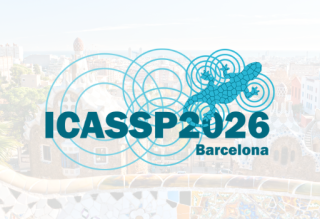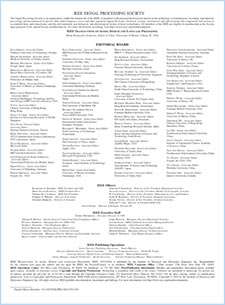- Our Story
- Publications & Resources
- Publications & Resources
- Publications
- IEEE Signal Processing Magazine
- IEEE Journal of Selected Topics in Signal Processing
- IEEE Signal Processing Letters
- IEEE Transactions on Computational Imaging
- IEEE Transactions on Image Processing
- IEEE Transactions on Information Forensics and Security
- IEEE Transactions on Multimedia
- IEEE Transactions on Signal and Information Processing over Networks
- IEEE Transactions on Signal Processing
- IEEE TCI
- IEEE TSIPN
- Data & Challenges
- Submit Manuscript
- Guidelines
- Information for Authors
- Special Issue Deadlines
- Overview Articles
- Top Accessed Articles
- SPS Newsletter
- SigPort
- SPS Resource Center
- Publications FAQ
- Blog
- News
- Dataset Papers
- Conferences & Events
- Community & Involvement
- Professional Development
- For Volunteers
- Information for Authors-OJSP
-
Home
Conferences Events IEEE Signal Processing Magazine IEEE SPL Article IEEE TIFS Article IEEE TMM Article IEEE TSP Article Jobs in Signal Processing Lectures Machine Learning Seasonal Schools Signal Processing News SPM Article SPS Distinguished Lectures SPS Newsletter Article SPS Webinar SPS Webinars SPS Webinar Series Webinar webinars
-
Our Story
What is Signal Processing?

The technology we use, and even rely on, in our everyday lives –computers, radios, video, cell phones – is enabled by signal processing. Learn More » -
Publications & Resources
-
SPS Resources
- Signal Processing Magazine The premier publication of the society.
- SPS Newsletter Monthly updates in Signal Processing
- SPS Resource Center Online library of tutorials, lectures, and presentations.
- SigPort Online repository for reports, papers, and more.
- SPS Feed The latest news, events, and more from the world of Signal Processing.
-
SPS Resources
-
Conferences & Events
-
Community & Involvement
-
Membership
- Join SPS The IEEE Signal Processing Magazine, Conference, Discounts, Awards, Collaborations, and more!
- Chapter Locator Find your local chapter and connect with fellow industry professionals, academics and students
- Women in Signal Processing Networking and engagement opportunities for women across signal processing disciplines
- Students Scholarships, conference discounts, travel grants, SP Cup, VIP Cup, 5-MICC
- Young Professionals Career development opportunities, networking
- Get Involved
-
Technical Committees
- Applied Signal Processing Systems
- Audio and Acoustic Signal Processing
- Bio Imaging and Signal Processing
- Computational Imaging
- Image Video and Multidimensional Signal Processing
- Information Forensics and Security
- Machine Learning for Signal Processing
- Multimedia Signal Processing
- Sensor Array and Multichannel
- Signal Processing for Communication and Networking
- Signal Processing Theory and Methods
- Speech and Language Processing
- Technical Working Groups
- More TC Resources
-
Membership
-
Professional Development
-
Professional Development
- Signal Processing Mentorship Academy (SigMA) Program
- Micro Mentoring Experience Program (MiME)
- Distinguished Lecturer Program
- Distinguished Lecturers
- Distinguished Lecturer Nominations
- Past Lecturers
- Distinguished Industry Speaker Program
- Distinguished Industry Speakers
- Distinguished Industry Speaker Nominations
- Industry Resources
- IEEE Training Materials
- Jobs in Signal Processing: IEEE Job Site
-
Career Resources
- SPS Education Program Educational content in signal processing and related fields.
- Distinguished Lecturer Program Chapters have access to educators and authors in the fields of Signal Processing
- Job Opportunities Signal Processing and Technical Committee specific job opportunities
- Job Submission Form Employers may submit opportunities in the area of Signal Processing.
-
Professional Development
-
For Volunteers
-
For Board & Committee Members
- Board Agenda/Minutes* Agendas, minutes and supporting documentation for Board and Committee Members
- SPS Directory* Directory of volunteers, society and division directory for Board and Committee Members.
- Membership Development Reports* Insight into the Society’s month-over-month and year-over-year growths and declines for Board and Committee Members
-
For Board & Committee Members
Popular Pages
Today's:
- SPS BSI Webinar: Integration of Brain Imaging and Genomics with Interpretable Multimodal Collaborative Learning
- Publications & Resources
- Guidelines for Reviewers
- Signal Processing 101
- Information for Authors
- 2025 IEEE International Workshop on Information Forensics and Security (WIFS)
- IEEE Signal Processing Letters
- About Transactions on Image Processing
- (ACSSC 2018) 2018 Asilomar Conference on Signals, Systems and Computers
- Industry Board
- Meet SPS Member Arvind Rao
- Jobs in Signal Processing
- (ISBI 2026) 2026 IEEE 23rd International Symposium on Biomedical Imaging
- SPS Travel Grants
- Member Discounts: Mobile Property Insurance for Regions 8-10
All time:
- Information for Authors
- Submit a Manuscript
- IEEE Transactions on Image Processing
- IEEE Transactions on Information Forensics and Security
- IEEE Transactions on Multimedia
- IEEE Transactions on Audio, Speech and Language Processing
- IEEE Signal Processing Letters
- IEEE Transactions on Signal Processing
- Conferences & Events
- IEEE Journal of Selected Topics in Signal Processing
- Information for Authors-SPL
- Conference Call for Papers
- Signal Processing 101
- IEEE Signal Processing Magazine
- Guidelines
Last viewed:
- Did you know about GoogleApps@IEEE
- SPS BSI Webinar: Integration of Brain Imaging and Genomics with Interpretable Multimodal Collaborative Learning
- (ISBI 2026) 2026 IEEE 23rd International Symposium on Biomedical Imaging
- Distinguished Lecture: Prof. Farhan Baqai (Apple, USA)
- (ACSSC 2018) 2018 Asilomar Conference on Signals, Systems and Computers
- IEEE Transactions on Signal Processing
- Guidelines for Reviewers
- Multimedia Prize Paper Award
- Member Discounts: Mobile Property Insurance for Regions 8-10
- Editorial Board
- Publications & Resources
- Subcommittees
- LOCATA Challenge
- Signal Processing Cup
- (CAI 2026) IEEE Conference on Artificial Intelligence 2026
Deep Learning-Based Non-Intrusive Multi-Objective Speech Assessment Model With Cross-Domain Features
You are here
Publications & Resources
For Authors
Top Reasons to Join SPS Today!
1. IEEE Signal Processing Magazine
2. Signal Processing Digital Library*
3. Inside Signal Processing Newsletter
4. SPS Resource Center
5. Career advancement & recognition
6. Discounts on conferences and publications
7. Professional networking
8. Communities for students, young professionals, and women
9. Volunteer opportunities
10. Coming soon! PDH/CEU credits
Click here to learn more.
Deep Learning-Based Non-Intrusive Multi-Objective Speech Assessment Model With Cross-Domain Features
This study proposes a cross-domain multi-objective speech assessment model, called MOSA-Net, which can simultaneously estimate the speech quality, intelligibility, and distortion assessment scores of an input speech signal. MOSA-Net comprises a convolutional neural network and bidirectional long short-term memory architecture for representation extraction, and a multiplicative attention layer and a fully connected layer for each assessment metric prediction. Additionally, cross-domain features (spectral and time-domain features) and latent representations from self-supervised learned (SSL) models are used as inputs to combine rich acoustic information to obtain more accurate assessments. Experimental results show that in both seen and unseen noise environments, MOSA-Net can improve the linear correlation coefficient (LCC) scores in perceptual evaluation of speech quality (PESQ) prediction, compared to Quality-Net, an existing single-task model for PESQ prediction, and improve LCC scores in short-time objective intelligibility (STOI) prediction, compared to STOI-Net, an existing single-task model for STOI prediction. Moreover, MOSA-Net can be used as a pre-trained model to be effectively adapted to an assessment model for predicting subjective quality and intelligibility scores with a limited amount of training data. Experimental results show that MOSA-Net can improve LCC scores in mean opinion score (MOS) predictions, compared to MOS-SSL, a strong single-task model for MOS prediction. We further adopt the latent representations of MOSA-Net to guide the speech enhancement (SE) process and derive a quality-intelligibility (QI)-aware SE (QIA-SE) approach. Experimental results show that QIA-SE outperforms the baseline SE system with improved PESQ scores in both seen and unseen noise environments over a baseline SE model.
SPS Social Media
- IEEE SPS Facebook Page https://www.facebook.com/ieeeSPS
- IEEE SPS X Page https://x.com/IEEEsps
- IEEE SPS Instagram Page https://www.instagram.com/ieeesps/?hl=en
- IEEE SPS LinkedIn Page https://www.linkedin.com/company/ieeesps/
- IEEE SPS YouTube Channel https://www.youtube.com/ieeeSPS
Home | Sitemap | Contact | Accessibility | Nondiscrimination Policy | IEEE Ethics Reporting | IEEE Privacy Policy | Terms | Feedback
© Copyright 2025 IEEE - All rights reserved. Use of this website signifies your agreement to the IEEE Terms and Conditions.
A public charity, IEEE is the world's largest technical professional organization dedicated to advancing technology for the benefit of humanity.









